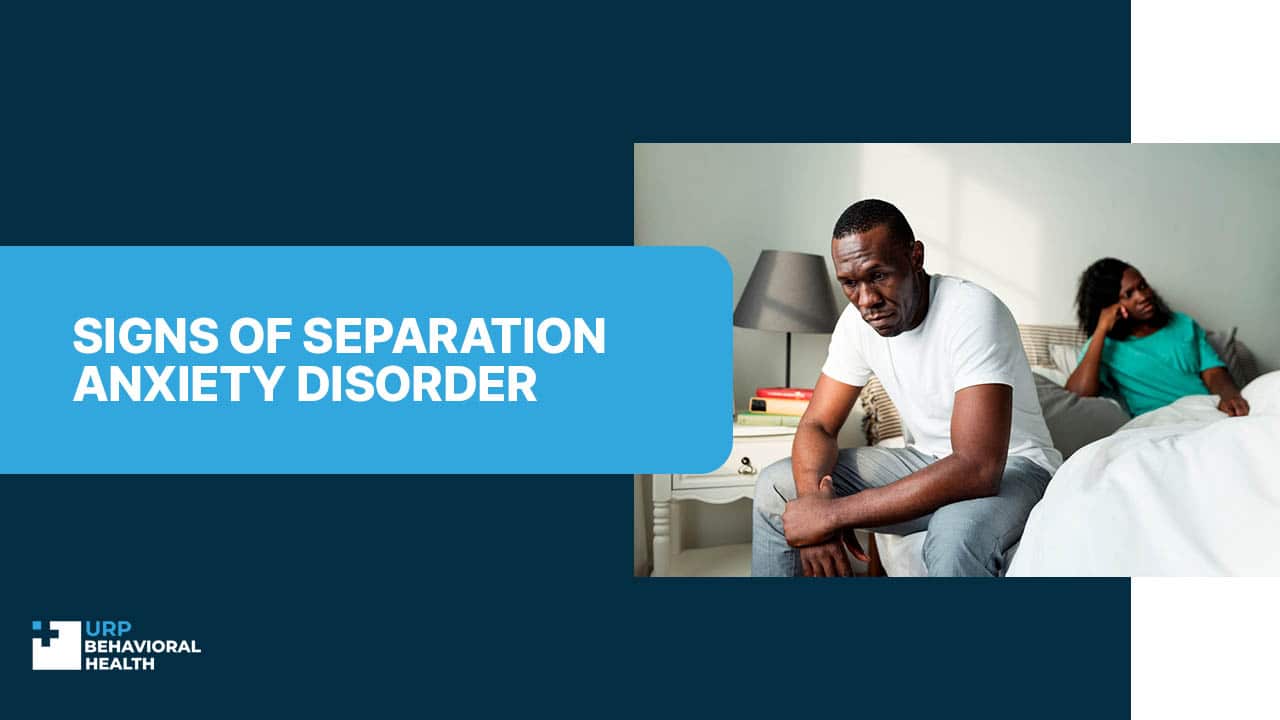
Signs of Separation Anxiety Disorder
Do you feel an overwhelming sense of unease or considerable worry being far from your kith and kin? These can be signs of separation anxiety, which induces profound concern and makes routine functioning problematic. If you are searching for how to tell if I have separation anxiety, this is the right site to land. Let’s delve into separation anxiety adults symptoms, major determinants, prospective risk factors, and treatment choices.
Understanding Separation Anxiety Disorder: Overview
Separation anxiety disorder is mostly viewed as a childhood mental health condition associated with kids’ attachment to their parents or guardians. Minors may reject going out of home and weep or cling to their loved ones in case they anticipate parting [1].
Can adults get separation anxiety? As claimed by a survey [2], the lifetime predominance estimate of adult separation disorder is 6.6%. This means people can experience intemperate and lasting fear or concern about separation from their attachment figure, regardless of age. In grownups, the condition is commonly focused on a child or romantic partner.
Reach out today and let us create a treatment plan designed around your needs.
Common Symptoms of Separation Anxiety Disorder
Adult separation anxiety symptoms become evident when a person faces separation from a loved one or believes this scenario is possible. This state may largely hinder daily or working activities and responsibilities.
What does separation anxiety feel like? Key separation anxiety disorder adults symptoms may comprise [1]:
- Persistent and drastic distress when foreseeing likely separation;
- Acute concern about a kid or a partner becoming harmed, ill, or dead;
- Protesting at going somewhere without a loved one because of fear of parting;
- Periodic separation-related night terrors;
- Habitual complaints of symptoms like dizziness, headaches, or stomachaches preceding moving apart from a significant other;
- Sustained panic attacks when a loved one is absent;
- Trouble concentrating;
- Urge to be together with an attachment figure everywhere they go.
These signs of separation anxiety in adults induce them to steadily seek assurance and consolation from their significant others, resulting in deficient boundaries with partners or kids. They may seem clingy to partners and excessively involved with children.
What Causes Separation Anxiety in Adults?
This disorder is believed to originate from both genetic and environmental issues. Possible triggers are family history of this clinical disorder, changes in parental behavior aimed at preventing apprehension-related distress in a kid [3], and childhood background of:
- uncoupling from a significant other;
- loss of a much-loved pet;
- parents’ divorce;
- shifting schools;
- relocating to a new site;
- parting from a family;
- a loved one’s death.
Accompanying life stresses can provoke modifications to chemicals linked to genes that impact their functionality.
Contact our admissions team now to begin your path toward a brighter future.
Risk Factors: Who Is Most Vulnerable?
How to know if you have separation anxiety or are susceptible to its development? Though the precise diagnosis can come only from a well-versed clinician, you may consider the following risk factors to better orient yourself on the topic [4]:
- a stressful event associated with the uncoupling from an attachment figure;
- insecure attachment style;
- intolerance to ambivalence;
- neurological trauma;
- being diagnosed with the condition as a kid;
- preexistent clinical disorders.
Coupled with the foregoing causes, these factors put a person at an increased risk of separation anxiety manifestation.
Diagnosis and Treatment Options for Separation Anxiety Disorder
This mental health disorder is diagnosed when signs, symptoms of separation anxiety in adults persist over six months and incite major distress or trouble running everyday errands [5]. The sooner a clinical disorder is diagnosed, the more chances to stop it from progressing. People may have distinctive responses to treatment, making it vital to ask a mental health professional with vast expertise in anxiety disorders to clarify “Do I have separation anxiety?”
Mental health professionals may implement different approaches to detect separation anxiety in adults, signs, and symptoms in particular. Typically, they offer to pass specialized tests and conduct a thorough psychological evaluation, which entails discussing your prevailing thoughts, feelings, and demeanors [6].
The treatment plan is based on the results of this assessment and aims to lessen the troublesome symptoms. :
- Psychotherapy. Certain types of therapy, like cognitive behavioral therapy, focus on easing apprehension by learning how to gain more control of your thoughts and manage acute concerns about parting and ambiguity.
- Medicines. If symptoms are severe, therapy is applied along with medicines. It’s crucial to follow the prescribed dosage to avert relapses or symptom aggravation.
If you feel that overwhelming nervousness in the absence of your significant one negatively impacts your everyday functioning, you may need professional assistance. Feel free to get in touch with a healthcare expert if you feel any unease about your mental or emotional state: separation anxiety commonly doesn’t pass without a trace on its own.
Don’t wait - confidential help is available right now for you or your loved one.
Resources
- Joshua Feriante, Tyler J. Torrico, Bettina Bernstein. Separation Anxiety Disorder. Link: https://www.ncbi.nlm.nih.gov/books/NBK560793/. Access date: July 10, 2025.
- Katherine Shear et al. Prevalence and Correlates of Estimated DSM-IV Child and Adult Separation Anxiety Disorder in the National Comorbidity Survey Replication (NCS-R). Am J Psychiatry. 2006 Jun; 163(6): 1074–1083. Link: https://pmc.ncbi.nlm.nih.gov/articles/PMC1924723/. Access date: July 10, 2025.
- Gillian A. Weeks et al. Family Accommodation and Separation Anxiety: The Moderating Role of Child Attachment. 2023 Nov 20. Link: https://pmc.ncbi.nlm.nih.gov/articles/PMC10690319/. Access date: July 10, 2025.
- Hongjin Zhou. Risk Factors Relevant to Adult Separation Anxiety Disorder. Vol. 5 (2024): 3rd International Conference on Education Reform, Humanities and Social Studies (ERHSS 2024). Link: https://wepub.org/index.php/TSSEHR/article/view/1172. Access date: July 10, 2025.
- Susan M. Bögels, Susanne Knappe, Lee Anna Clark. Adult separation anxiety disorder in DSM-5. Clinical Psychology Review. Volume 33, Issue 5, July 2013, Pages 663-674. Link: https://www.sciencedirect.com/science/article/abs/pii/S0272735813000469. Access date: July 10, 2025.
- Megan C Finsaas et al. Psychometric analysis of the Adult Separation Anxiety Symptom Questionnaire: Item functioning and invariance across gender and time. Psychol Assess. 2020 Mar 12; 32(6): 582–593. Link: https://pmc.ncbi.nlm.nih.gov/articles/PMC8108118/. Access date: July 10, 2025.
















